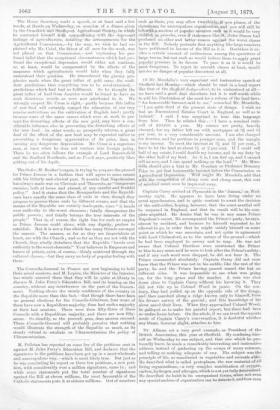Captain Carey arrived at Plymouth in the Jumna,' on Wed-
nesday night. He appears to have been living under no great apprehension, and is qUite content to await the decision of the authorities, hoping, however, that the court-martial will be reopened in England, and that its result will be his com- plete acquittal. He denies that he was in any sense Prince Napoleon's escort. He accompanied the Prince's party, ho says, almost by accident, and because he himself requested to be allowed to go, in order that he might satisfy himself on some point on which he was uncertain, and not quite in agreement with Lord Chelmsford, as to the nature of the ground—which he had been employed to survey and to map. He was not aware that Colonel Harrison even mentioned the Prince to him in any sense as if he were to look after the Prince's-safety ; and if any such word were dropped, he did not hear it. The Prince commanded absolutely. Captain Carey did not oven know that the Prince was not in his saddle, like the rest of the party, ho and the Prince having passed round the but on different sides. It was impossible to see what was going on, for the long grass and the mealies. A man was shot down close to Captain Carey without his lr,nowing it. They did not ride up to Colonel Wood in panic. On the con- trary, they had pulled up on the opposite side of the donge, and then marched along a ridge known only to himself, from his former survey of the ground ; and this knowledge of his alone saved their lives. When they-approached Colonel Wood, he galloped on to make his painful report, but.there had been no undue haste before. Qn the whole, if we can trust the reports made of Captain Carey's conversation, it is doubtful whether any blame, however slight, attaches -to him.






























 Previous page
Previous page